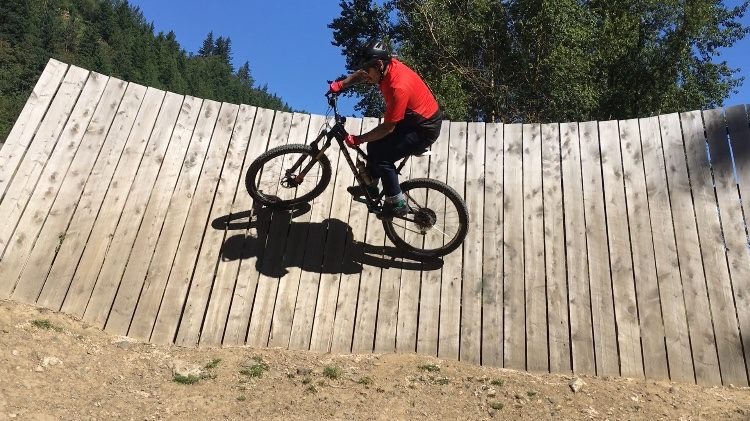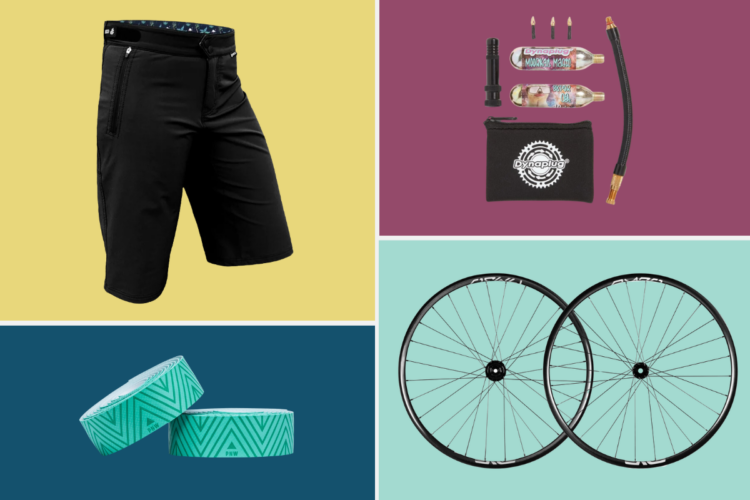
Every year the Single Speed World Championships shenanigan that’s disguised as a mountain bike race rolls into a new location to spread beer foam and over-geared sweat on every surface. Following the planned-ish debauchery, the fastest female and male spinners who managed to sneak the most sleep the night prior are crowned winners at the finish line. The pair are promptly sent to unglue their lycra so they can be tattooed with trophy art while everyone else resumes their drinking and fire jumping activities. Whether they like tattoo art or not, the winners signed up for it when they didn’t let someone else win. It’s a painful contract from all sides.
Portland, Oregon resident, shredder, and tattoo artist Jake Tong was perched at the finish line of the 2018 event in Bend Oregon, to give the champs their earned art installments. Tong started working as an ink artist in his hometown of Manchester, New Hampshire, in 2002 and relocated to the Pacific Northwest in 2008. He says of his artistic style, “While a majority of my requests are for neo-traditional and anime-style tattoos, I like to think of myself as well rounded tattooer and enjoy many styles.”
He also started riding bikes while on the east coast, after deciding he had broken enough bones skateboarding. He entered cycling culture the way a lot of skater punks do: through fixed gear fun. “After multiple surgeries, I couldn’t skate anymore. I went for the next thing that was gonna give me a rush.” Living next door to the velodrome in Manchester, he quickly caught up with the fast brakeless crowd, then slowly moved to longer road riding, and eventually started racing dirt in the massive Oregon cyclocross scene.
After making the cross country trek to Oregon, Tong dove head first into the mud, photographing cyclocross races before and after his own race laps, and collecting sponsorships for an adventure cycling ambassadorship titled The Wolf’s Mouth. The video below eloquently shares some of those experiences.
Though he has moved away from racing somewhat to focus on fun rides, family, and his art career, Tong did take on the venerated Grinduro in California in 2018. “That was ridiculously hard. I was only a little bit away from a bad head injury so I hadn’t been riding very much, but I was like ‘it’s only sixty miles. It’s not that big of a deal.’ My first mistake was riding a cross bike. Definitely a 29er would have been ideal. I can’t even remember how much climbing I did. I haven’t had my legs spasm to where I could see the muscles through my bibs just spasming. That was just hurting so bad. But, the Grinduro on a whole was really fun. The experience of camping and hanging out with people was super fun.”
Both of Tong’s parents are Chinese immigrants, and his mother tongue is Cantonese–which he speaks fluently. His folks met at a Chinese restaurant in New Hampshire where Tong’s father was working for a man who would later become his father in law. I asked Tong about his experience as a person of color in the New Hampshire and Oregon cycling scenes, and he shared some concerns and helpful suggestions.

Tong found it easy to join the local fixed gear scene in Portland and quickly found folks to go on road and gravel rides with around the city. “I was pretty well received. There weren’t that many Asian people or even that many people of color in the community at that point. […] You’re seeing a lot more people of color now in the Portland scene. They’re all younger kids too. I think they’re making it more accessible. You and I know it’s not like skateboarding where you get a board and it doesn’t matter what kind of shoes you have, and you can go out and skate. This is not a poor man’s sport. I think that with a lot of donations they’re helping kids that wouldn’t have an opportunity to get into cycling.” Though he did mention being seen as the “token Asian kid” by some of his peers, Tong says that today he feels fueled and focused as an artist and a rider in Portland, and couldn’t imagine living anywhere else.
Many of the problematic experiences Tong mentioned are those that all cyclists encounter while riding and training on the road, largely related to redneck drivers. On one particular trip back home to New Hampshire, he mentioned that “I must have had eighteen Gatorade bottles chucked at me on one ride from people in big ass trucks or teens in their mom’s PT Cruiser. Around Portland, you’re mostly not going to get a bottle whipped at you every time you go out.” Tong also mentioned that in east coast cycling culture folks were more likely to drive to a place and ride their bikes, rather than riding from their doorstep.
Things aren’t always rosy in the Rose City. No matter what flavor of cycling you prefer, everyone in Portland has to ride on the road to stay fit, as the urban area has virtually zero legal singletrack. Tong recalled one group training ride he was on when a car cut off the group, as often happens, and one of the riders yelled “fucking Asian drivers.” He says this was one of the only examples of overt racism he has experienced in his cycling community, apart from the more general rural racism that he says is just part of leaving the city.
He mentioned multiple racist experiences alongside a more general hatred of cyclists in rural areas. “Then you have the racist people in the countryside that are deliberately smoking you with their gigantic diesel trucks. I get that feeling even more so in New Hampshire. It’s a split state ya know. There are no good coffee shops there to start your ride, so you’re going to like Dunkin’ Doughnuts in your spandex. They already don’t see people of color very often, then to see a person of color in spandex is–it fucking feels like daggers. At least in Oregon, they’re used to the cyclist part. They may not be used to the color part, but at least they have one of them. So it’s not as bad. But I definitely always worry when I’m in the middle of nowhere. Like when I rode back from Seattle, I left the city I was like ‘am I gonna get murdered? Am I gonna get shot and left out here?'”
Tong shared a few other stories about interactions with racist skinheads in the punk scene in his home town of Manchester, mentioning that the area felt “extremely racist” and ultimately that’s why he decided to move away. “I remember, I was a punk kid, and I went to this party. I went to get a beer and this skinhead just put his boot down on the keg and said ‘what the fuck do you want?’ I was like ‘yep, I’m leaving New Hampshire.'” He said that his older brother has shared some experiences of overt racism recently that make it clear, things back home haven’t changed much.

Toward the end of our chat, Tong discussed ways that individual cyclists and the larger industry could create a more welcoming culture around cycling. In addition to his own efforts to create a local Asian cycling club, he offered up some thoughtful points. “The cycling industry has so much to do, and it’s not just based on color or gender. It’s very rare to see models that aren’t 5’11” and 130 pounds. Super skinny. Let alone seeing someone of color. It wasn’t until like two years ago that I would even see [brands] like Rapha with Black people in their commercials. Otherwise, there would never be any people of color unless it was maybe a Rapha Shanghai add. Then there would be a group of Asian riders.”
Tong continued with this thread of representation in the bike industry marketing. “All these people [in bike ads] are just the same stereotype of a tall white dude. That puts a lot of people out. Saying that you have to be this certain type of person to get into it.”
He also noted that there is a narrow representation of what a cyclist’s body looks like in marketing material and related products. “Also bringing in different shapes, like heavier set riders. And even making products specifically for them. Or, for us I should say. [For example] I only wear Oakley’s because they’re one of the only companies that make something directly for Asian people. I can’t wear other glasses because of the bridge of my nose, like most Asian people. But Oakley has been making Asian Fit. I think making products that are for everyone, and not one certain type of person is really big.”
It’s a male-dominated industry, and because of that, we’re only seeing it from one viewpoint. I think things are just on the tip of starting to change and accept other people. Whether it be their sex, ethnicity, whatever it might be.

At 5’5″ Tong wears a medium cycling bib but says that he always has to roll up the legs because otherwise, they cover his knees. Noticing the important fit dynamics and needs of a broader range of body shapes is another clear step the industry could take toward welcoming a more diverse population of riders.
On representation and role models more broadly he said “Putting people of color into it [cycling] to show the next generation that yeah, you can figure out a way to get into the sport. There are people of color you can look up to as role models. And different genders, or non-gender. It should be a sport for everybody. When bicycles were made, it wasn’t for a specific person. But somehow, in the United States, you’re not really seeing a good mix of people. And, I think that is the industry’s fault for limiting what they show us.”
“I remember Ji Cheng. He was the first Chinese rider in the Tour de France. I was so fucking amped! He came in like Lantern Rouge. He was literally the last person to come through and I didn’t care. When I look at kids in places like New York, the have fixed gear role models who are African Americans or Latinos. They are probably inspiring the next wave of cyclists to come in. But I just don’t think it’s the cycling industry’s key demographic. And that really is upsetting.”
“It would be so good for different communities to get hooked on cycling. You can’t smoke and go fast. You just can’t. When you get into cycling you make sacrifices because the sport is so exciting and so new.”

A huge thanks to Jake for taking the time to share his story. You can collect some of his art by making an appointment at Anatomy Tattoo in Portland, or check his traveling dates to see when he will be guest inking near you.





















